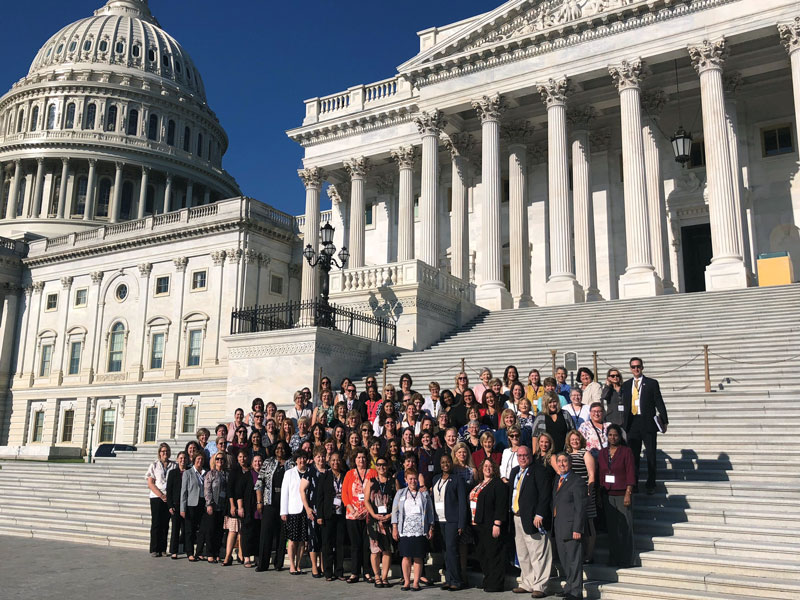Government Shutdown; ACA Ruled Invalid; Medicare for All Push

On January 3, 2019, the newly elected, Democrat-controlled House of Representatives introduced legislation to reopen the federal government and end the current shutdown. It’s not about the money, which is usually the case; it’s about the blame. The border wall funding—in whatever capacity—is politically driving the shutdown. But Senator Mitch McConnell (R-KY) doesn’t want to take up a Democrat-sponsored bill that he knows the president will veto. Democrats want that to happen to force the president to either accept the blame for the shutdown or to cave without funding for the wall and reopen the government.
Oncology Nurses Are Vital to Tobacco Control and Smoking Cessation Efforts Worldwide

The World Health Organization indicated that tobacco use is the most preventable cause of cancer worldwide. Globally, more than 7 million people die each year from causes associated with tobacco use and tobacco-related diseases. Despite recent trends that show falling rates for U.S.-based smokers, much work still must be done. Oncology nurses around the world can make a difference by engaging in prevention and treatment tactics, working with policymakers, and educating their communities and patients about tobacco control.
- Read more about Oncology Nurses Are Vital to Tobacco Control and Smoking Cessation Efforts Worldwide
- Add new comment
BRCA Is Not the Only Common Variant for Breast and Ovarian Cancer

Multigene testing for hereditary breast and ovarian cancer has increased the detection predisposition genes beyond BRCA1 and BRCA2, according to study findings presented at the San Antonio Breast Cancer Symposium on December 7, 2018.
What Is Metformin’s Impact on Pancreatic Cancer Risk?

Metformin is one of the oldest and most reliable pharmacologic treatments for type-2 diabetes and had, in the past, been suggested as a potential pancreatic cancer risk reducer in the National Comprehensive Cancer Network (NCCN) guidelines for pancreatic adenocarcinoma. Although more recent versions of the guidelines have removed that language, our team was curious about the possible link between metformin and pancreatic cancer risk.
What the Midterm Election Results Mean for Health Policy in 2019

Election results may appear to be seismic shifts, jarring the foundations of the American political system to its core as voters stare in disbelief, attempting to translate the meaning of the public’s intent. But is that really the case?
Cancer Prevention: Oncology Nurses Save Lives by Raising Awareness

Despite flashy television campaigns, countless pamphlets and brochures, and seemingly constant reminders, people are still unaware of important cancer prevention information. The World Health Organization estimated that 30%–50% of all cancer cases are preventable. But between modifiable behaviors, hereditary and genetic risks, infectious agents, and more, the general public finds itself mostly unprepared to tackle the cancer prevention conversation.
Immunotherapy May Increase Risk for Hyperprogressive Lung Cancer

Some patients receiving checkpoint inhibitors for lung cancer may experience increased risk for hyperprogressive disease (HPD), according to results of a study reported in JAMA Oncology.
Take a Closer Look at Immune Checkpoint Inhibitors

One way that cancer has been able to evade the immune system is through overexpression of immune checkpoint proteins (immune inhibitory pathway), which allow cancer cells to be considered “self” instead of foreign and block T-cell action. Immune checkpoint proteins cytotoxic T-lymphocyte–associated 4 (CTLA-4) and programmed cell death protein (PD-1) are receptors that are expressed on the surface of cytotoxic T cells. Immune checkpoint inhibitors prevent those receptors from binding to their natural ligands, disrupting the immune inhibitory pathway. See Table 1 for a list of approved agents and indications.
Capitol Hill Days Brings Nurses’ Voices to Policymakers

Since 2016, ONS has gathered hundreds of nurse advocates in the nation’s capital to speak truth to power during its annual Hill Days conference. This two-day meeting brings more than 100 oncology nurses to Washington, DC, to learn about the Society’s health policy legislative agenda and to be trained in how to educate elected officials on the priority issues most important to ONS members.
Lack of AR Expression May Cause Prostate Cancer Treatment Resistance

Prostate cancer cells lacking androgen receptor (AR) expression do not respond to treatment and are more likely to grow, researchers reported in study findings published in Nature Communications.





